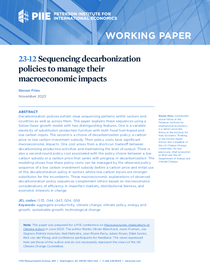Sequencing decarbonization policies to manage their macroeconomic impacts

Peter G. Peterson Institute for International Economics, Washington, DC
Peterson Institute - Washington, DC
2023
32 p.
decarbonization ; climate change ; sustainable development ; just transition ; technological change ; macroeconomics ; economic impact
Working Paper
23-12
Economic development
https://www.piie.com/sites/default/files/2023-11/wp23-12.pdf
English
Bibliogr.
"Decarbonization policies exhibit clear sequencing patterns within sectors and countries as well as across them. This paper explains these sequences using a Solow-Swan growth model with two distinguishing features. One is a variable elasticity of substitution production function with both fossil fuel–based and low carbon inputs. The second is a choice of decarbonization policy: a carbon price or low carbon investment subsidy. Their policy costs have significant macroeconomic impacts. One cost arises from a short-run tradeoff between decarbonizing productive activities and maintaining the level of output. There is also a second-round policy cost associated with the policy choice between a low carbon subsidy or a carbon price that varies with progress in decarbonization. The modeling shows how these policy costs can be managed by the observed policy sequence of a low carbon investment subsidy before a carbon price and initial use of this decarbonization policy in sectors where low carbon inputs are stronger substitutes for the incumbents. These macroeconomic explanations of observed decarbonization policy sequences complement others based on microeconomic considerations of efficiency in imperfect markets, distributional fairness, and economic interests in change."
Digital
The ETUI is co-funded by the European Union. Views and opinions expressed are however those of the author(s) only and do not necessarily reflect those of the European Union or the ETUI.